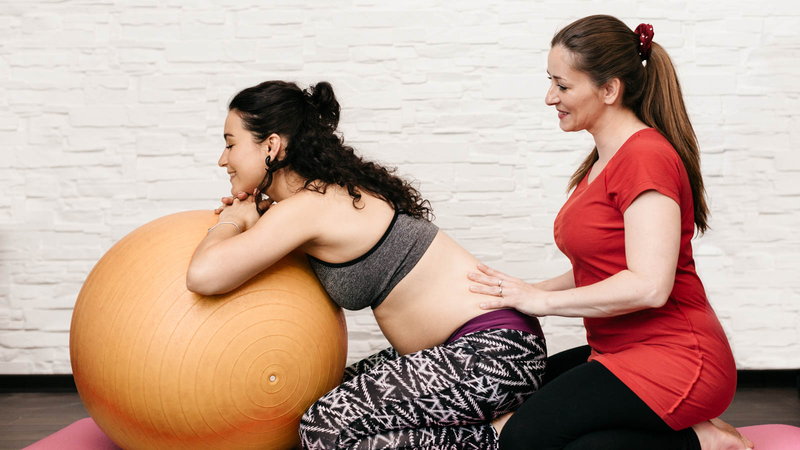
Now that you have entered your third trimester, you may be spending more time thinking and preparing for your baby’s birth. You may have taken a childbirth class already, and you probably have some ideas about what your baby’s birth will be like. If this is not your first baby, you may want to do things differently with this baby than you did with your first. If you are considering having a natural childbirth, you may want to consider hiring a doula. A doula is a paid labor and childbirth assistant. A doula provides emotional and physical support for the couple during labor. In this week’s newsletter, we are going to discuss the benefits of hiring a doula and give you some information on how to hire a doula.
What Is Going on with Mom & Baby
 Baby is the size of an eggplant!
Baby is the size of an eggplant!
Baby: Baby’s crown to rump length is around 26 cm (10.2 inches). Your baby weighs about 1100-1250 grams (2.4-2.75 pounds). Your baby is picking up body fat and filling out. She is able to partially control her own body temperature now. Your baby is not ready to be born yet, but at 28 weeks, babies have an 80% survival rate.
Mom: You may start seeing your doctor every two weeks now. You are getting closer to delivering your baby and will want to be familiar with the signs of preterm labor. If you notice cramping, a dull backache, leaking fluids (if you think your water has broken or is leaking), bleeding or discharge, pelvic pressure or contractions every ten minutes or less, you should call your doctor.
This Week’s Pregnancy Checklist
- Keep all of your scheduled appointments.
- Purchase a couple of outfits for your baby.
- Purchase a bassinet or playpen for your baby.
- Contact and/or interview pediatricians for your baby.
- Talk to your doctor about any vacations or travel plans.
- Take a new belly picture for your scrapbook or journal.
The Benefits of Having a Doula During Childbirth
There are two types of doulas: birth doulas and postpartum doulas. A birth doula helps during labor and shortly after childbirth, whereas a postpartum doula provides support to the mom during the first few weeks after baby’s birth.
What does a doula do?
Normally, you will meet with your doula prior to birth and talk about your plans for labor. Your doula can assist you on writing a birth plan, deciding what pain relief techniques you would like to use, and she may also assist with breastfeeding after the baby is born. A doula will act as a support person for the mom, but also she will help to involve the dad in the birth process. She may help you with breathing techniques, massage, or other pain relief techniques as well as provide comfort and emotional support during your labor.
Why have a doula?
- 50% reduction of cesarean rate
- 25% shorter labor
- 60% reduction in requests for an epidural
- 40% reduction in the use of pitocin
- 40% reduction in forceps delivery
Several studies have shown that women who use the services of a doula are more likely to have a positive birth experience, are less likely to need pain medication, and are less likely to require a cesarean section. Your doula may help comfort you during labor or help be your voice when you are having a difficult time communicating during labor. She may also help you to fulfill your childbirth goals. If you would like to have a natural labor, a doula can help you to stay focused on your goals during labor. Your partner may struggle with seeing you in pain. Your doula will help take the pressure off of dad, and she may also assist him with things he can do to help during your labor.
Do you have to have natural childbirth if you use a doula?
No, your birth experience is up to you. Talk to your doula about your feelings. A doula is not intended to dictate your childbirth experience; she is more to help you to have a positive birth experience. She is there to make your birth the best experience for you, whether you decide to have a natural birth, have an epidural, or just take a “wait and see” approach. She will be able to help you make decisions during labor and also offer support to you in the event that you need intervention or decide that you need medication for pain relief.
How to Find a Doula?
You can look for a doula in your area by visiting Doulas of North America (www.dona.org). Look for a doula in your area and then schedule a time for you to meet with her. Most doulas do not charge for an initial interview, so this will give you an opportunity to get to know her and see if she seems like the right person for you to work with.
Some questions to ask during your interview:
- Tell me about the training you have received.
- Are you certified by the Doulas of North America?
- What is included in your services?
- How much do you charge for your services?
- How many births have you attended?
- How long have you been a doula?
- Are you available at all times, and what will happen if you are not available when I go into labor?
- What do you think you can do to make my childbirth experience better?
- Can you provide any references?
Rates for doulas vary from state to state but you can expect to pay around $200-$600 for a birth doula. Most insurance companies do not cover doula services, so you will need to leave room in your budget to pay for a doula. Your doula may set up a payment plan for you so that you can pay for her services in installments prior to the birth of your baby.
Next Week: 29 Weeks Pregnant: Your Pregnancy Week by Week
Last Week: 27 Weeks Pregnant: Your Pregnancy Week by Week

